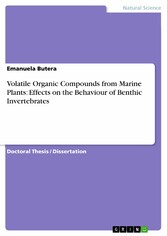Suchen und Finden
Volatile Organic Compounds from Marine Plants: Effects on the Behaviour of Benthic Invertebrates
Mehr zum Inhalt

Volatile Organic Compounds from Marine Plants: Effects on the Behaviour of Benthic Invertebrates
Doctoral Thesis / Dissertation from the year 2015 in the subject Biology - Ecology, grade: PhD, The Open University, course: Marine Chemical Ecology, language: English, abstract: Marine organisms rely on chemical cues - most as scents - to obtain information (i.e. infochemicals) about their environment. Volatile organic compounds (VOCs) from plants represent one group of infochemicals that can shape ecological interactions and the structure of the ecosystems through the influence of behaviour of receivers. However, there is still little evidence about the ecological importance of VOCs on the structure and interactions of mesograzers community within ecosystems like the Mediterranean seagrass Posidonia oceanica. The studies presented in this thesis were designed, using behavioural choice assays, to investigate the effects of epiphytes-borne VOCs from Posidonia oceanica on the associated benthic invertebrates and further clarify how their responses to these putative infochemicals could affect the spatial organization of this stable community. The objectives of this thesis were: 1) to standardize a behavioural choice method for benthic invertebrates (e.g. static chambers vs. flumes and the determination of the species-specific minimum number of replicates); 2) to define the existence of associative behavioural patterns of invertebrates (i.e. molluscs and decapods) to epiphyte-borne VOCs at the community level; 3) to identify the roles of VOCs as infochemicals (e.g. food or toxins cues); and 4) to investigate the behavioural responses to infochemicals within the range of pH levels predicted for the end of this century. Species-specific behaviours of mesograzers to VOCs depended on the method of investigation, the concentration of VOCs tested, body constraints and animal ecology. Overall, the contribution of this thesis to knowledge is that, within ecosystems like the seagrass P. oceanica, co-evolutionary patterns of infochemicals create microhabitats and the coexistence of herbivores on a single plant leaf. These findings support a better understanding of the entire ecosystem for further coastal management also in prevision of near-future climate changes.
Alle Preise verstehen sich inklusive der gesetzlichen MwSt.






